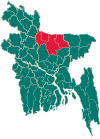Haluaghat Upazila
Haluaghat
হালুয়াঘাট | |
|---|---|
 Fields in Beltali village with Garo Hills in background | |
 | |
| Coordinates: 25°7.5′N 90°21′E / 25.1250°N 90.350°E | |
| Country | |
| Division | Mymensingh Division |
| District | Mymensingh District |
| Area | |
| • Total | 357.61 km2 (138.07 sq mi) |
| Population | |
| • Total | 316,539 |
| • Density | 890/km2 (2,300/sq mi) |
| Time zone | UTC+6 (BST) |
| Postal code | 2260[2] |
| Website | haluaghat |
Haluaghat (Bengali: হালুয়াঘাট) is an upazila of Mymensingh District in the Division of Mymensingh, Bangladesh. [3]
Geography
[edit]Haluaghat is located at 25°07′30″N 90°21′00″E / 25.1250°N 90.3500°E. It has 69,725 households and total area 357.61 km2.
There is a border checkpoint on the Bangladesh-India border at Haluaghat.[4]
Demographics
[edit]According to the 2011 Census of Bangladesh, Haluaghat Upazila had 69,725 households and a population of 290,043. 77,789 (26.82%) were under 10 years of age. Haluaghat has a literacy rate (age 7 and over) of 38.89%, compared to the national average of 51.8%, and a sex ratio of 1034 females per 1000 males. 11,710 (4.04%) lived in urban areas.[6][7]
As of the 1991 Bangladesh census, Haluaghat had a population of 242,339. Males constituted 50.68% of the population, and females 49.32%. This Upazila's eighteen up population was 122,863. Haluaghat had an average literacy rate of 22.8% (7+ years), and the national average of 32.4% literate.[8]
12,924 (4.46%) belong to the Indigenous communities. Ethnic communities in Haluaghat are: Garo, Hajong, Koch, Dalu, Bangshi Barman, Khatrio, Kurmi and Mal, although vast majority (over 96%) are Garo.[3]
Administration
[edit]Haluaghat Thana was formed in 1916 and it was turned into an upazila in 1983.[3]
The Upazila is divided into 12 union parishads: Amtoil, Bhubankura, Bildora, Dhara, Dhurail, Gazirbhita, Haluaghat, Jugli, Kaichapur, Narail, Sakuai, and Swadeshi. The union parishads are subdivided into 146 mauzas and 214 villages.[9]
See also
[edit]References
[edit]- ^ National Report (PDF). Population and Housing Census 2022. Vol. 1. Dhaka: Bangladesh Bureau of Statistics. November 2023. p. 401. ISBN 978-9844752016.
- ^ "Bangladesh Postal Code". Dhaka: Bangladesh Postal Department under the Department of Posts and Telecommunications of the Ministry of Posts, Telecommunications and Information Technology of the People's Republic of Bangladesh. 20 October 2024.
- ^ a b c Jalal Uddin Ahmed (2012), "Haluaghat Upazila", in Sirajul Islam and Ahmed A. Jamal (ed.), Banglapedia: National Encyclopedia of Bangladesh (Second ed.), Asiatic Society of Bangladesh
- ^ "Land Ports". Banglapedia. Retrieved 14 December 2018.
- ^ Population and Housing Census 2022 - District Report: Mymensingh (PDF). District Series. Dhaka: Bangladesh Bureau of Statistics. June 2024. ISBN 978-984-475-226-9.
- ^ "Community Tables: Mymensingh district" (PDF). bbs.gov.bd. 2011.
- ^ "Bangladesh Population and Housing Census 2011 Zila Report – Mymensingh" (PDF). bbs.gov.bd. Bangladesh Bureau of Statistics.
- ^ "Population Census Wing, BBS". Archived from the original on 2005-03-27. Retrieved November 10, 2006.
- ^ "District Statistics 2011: Mymensingh" (PDF). Bangladesh Bureau of Statistics. Archived from the original (PDF) on 13 November 2014. Retrieved 14 July 2014.

